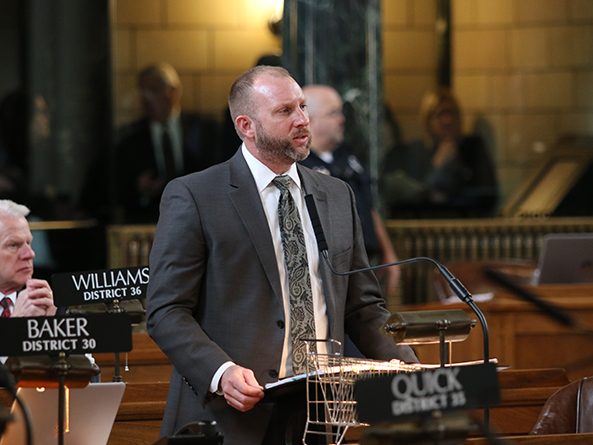Tax incentive audit bill narrowed, advanced
A bill intended to improve oversight of the state’s tax incentive programs by strengthening reporting requirements was narrowed significantly before being advanced from general file Feb. 28.

LB935, as introduced by the Legislative Performance Audit Committee, would make an array of information regarding the programs available and accessible to the Legislative Audit Office.
The Legislative Audit Office is required to conduct performance audits that review state agency programs in order to evaluate an agency’s success in effectively implementing legislative intent.
Heartwell Sen. John Kuehn, chairperson of the Performance Audit Committee, said the bill would implement recommendations gleaned from the three performance audits of the state’s tax incentive programs that have been completed.
For example, he said, in 2016, the Legislative Audit Office was not able to compare the level of job creation by companies participating in the Nebraska Advantage Act with that of nonparticipating companies.
“[The office] found that there is not enough data available in the current reporting mechanism on employees at Advantage Act projects to provide the analysis that the committee and the Legislature have requested,” Kuehn said.
An Executive Board amendment, adopted 37-0, replaced the bill. Under the amendment, the state tax commissioner could allow one designee from the state Department of Economic Development to review limited tax data—subject to strict confidentiality—only for the purpose of assisting the audit office with tax incentive program performance audits.
Omaha Sen. Burke Harr offered an amendment to the committee amendment, adopted 36-0, that instead would require the tax commissioner to do so.
Sen. Dan Watermeier, chairperson of the Executive Board, said the committee amendment would allow for a more thorough analysis of the types of jobs that participating companies are creating and provide a better picture to lawmakers of how the programs are being used.
“The provisions will still provide the audit office with needed data but will not require changes to DED’s data tracking system, thereby reducing the bill’s fiscal note,” Watermeier said.
The committee amendment also would limit the rest of the bill’s provisions to the Nebraska Advantage Act. As introduced, LB935 would have applied to eight tax incentive programs.
The committee amendment would require companies participating in the Nebraska Advantage Act to create an unemployment insurance account or accounts specific to program participants at each project location. It also would require reporting of wages paid, hours worked and job titles for new employees at each project location and limit the reporting of federal ID numbers and unemployment insurance numbers only to those affiliated with a company’s Nebraska businesses.
The state Department of Revenue would be required to retain for 20 years the tax returns, administrative data bases and spreadsheets, audits, contracts and agreements relating to program participants.
Omaha Sen. Ernie Chambers spoke in support of the bill and the amendment. The state’s tax incentive programs divert hundreds of millions of dollars from the state’s coffers, he said, and lawmakers have a right to know how the programs are being used.
“This is the Legislature’s best effort to bring sunshine into all of those corners where information can be found that will be necessary for the Legislature to make wise decisions in the best interest of the public who sent us here,” Chambers said.
Sen. Kate Bolz of Lincoln echoed his concerns. Tax incentive programs reduced the state’s revenues by an estimated $270 million in 2017, she said, and the Legislature needs the right tools to examine whether the incentives are providing the good jobs and strong economic development that was envisioned when they were created.
“This has a significant impact on our budget and it is right and fair to ask for information on how it is and isn’t working,” Bolz said.
Seward Sen. Mark Kolterman opposed the bill, saying the Nebraska Advantage Act is known throughout the country for its labor-intensive application process, lengthy wait times for approval of credits and extensive ongoing reporting and auditing processes. He said the benefits of the additional information that would be gained under the bill are unclear.
“Here, we are talking about adding to the already heavy burden on Nebraska Advantage participants,” Kolterman said. “What are we going to get from it? What are we going to gain?”
In response, Kuehn offered an amendment, adopted 43-0, that narrowed the bill further. The amendment removed the requirement that participating companies create separate unemployment insurance accounts with the state Department of Labor and reporting requirements regarding employee benefits.
Kuehn said the amendment “strips the bill down to the chassis” but was necessary due to concerns from the business community. The remaining provisions still would improve the quality of the legislative performance audits, he said.
“I’m disappointed that we have not taken a stronger stand as a body with regard to how we will provide this information to the public and to this body as a whole,” Kuehn said. “But I recognize that this is advancing us forward in the best [way] possible.”
Following adoption of the Kuehn amendment, the bill advanced to select file on a 36-0 vote.


